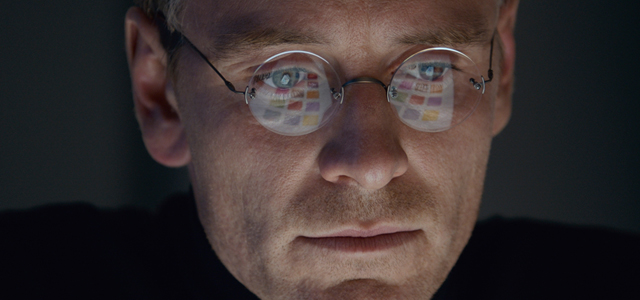
Steve Jobs

(M) Starring Michael Fassbender, Seth Rogen, Kate Winslet
How do you separate the man from the company that he represents? Steve Jobs has become synonymous with the Apple brand. He has been the subject of documentaries, biographies and a previous feature film. His reputation is as legendary as his impact on the computer industry. Regardless of your opinion of the man, it is hard to not miss the impact that he has had on world events in the past few decades.
The challenge for director Danny Boyle (Slumdog Millionaire) and writer Aaron Sorkin (The Social Network) is to make Jobs’ story appealing and palatable. The biography about Jobs by Walter Isaacson reveals that the Apple founder was not the most endearing of individuals. But instead of focusing upon all aspects of his life, the production team behind Steve Jobs chose to draw a portrait of Jobs across the establishment of one of the world’s most recognised brands. Three key product launches are the framework used to communicate the development of the company, the key working relationships in Jobs’ life and the progression of his role as a father to his estranged daughter, Lisa. As it unfolds, Steve Jobs projects how the tech pioneer’s passion and drive affected his own life — and the world.
The combination of Boyle and Sorkin is unsettling at first. Both have a unique manner of storytelling that may not seem to complement one another but, in the end, it comes together effectively. The successful lynch pin is the casting of Michael Fassbender (X-Men: Days of Future Past)as Jobs. His presence and intensity embodies the mythical Apple figure and provides the human frailty that is less known about his life. He is also one of the rare actors who can carry the weight of one of Sorkin’s trademarked “monologuing” scripts. Proving to be the right man for this role, Fassbender continues to be a force in Hollywood.
Boyle surrounds his leading man with a stellar cast that carry the story orbiting around Jobs. Kate Winslet (The Dressmaker) shows her uncanny ability to make a supporting character into a lead role. It would be worth analysing each character but, for the sake of this review, it only needs to be said that Jeff Daniels, Seth Rogen, and Michael Stuhlberg are perfectly suited for their place in this computer journey.
The cinematic stylings of Boyle, stellar performance of Fassbender and the superlative writing of Sorkin make this film a gem, but the challenge is celebrating the man at the centre of the story. Steve Jobs may have been a genius in promotion and seeing business trends, but it is his persona that is on display in this character play. Jobs’ charisma is unquestionable but, even for the most loyal Apple fans, his temperament is hard to stomach. Bringing a dose of reality to biopics makes for good cinema and the director should never shy away from full disclosure. But the Achilles heel of the whole Steve Jobs cinematic experience is the detestable nature of Jobs himself. Unlike Sorkin’s management of Mark Zuckerberg in The Social Network — who, in the end, came off as pitiable — Steve Jobs remains the same person throughout his life. In the end, everyone else must bend to his will. The inclusion of his daughter in the storyline does soften the message but, ultimately, there is not much to celebrate in the personal life of Steve Jobs.
Danny Boyle has delivered an excellent excursion through the life of the computer visionary and Fassbender delivers a performance of a lifetime, but the film suffers from its subject matter. It might be worth allowing Jobs to move into the realm of mythology and forget to analyse the realities of the man behind the machine.
What are some of the bigger questions to consider from this film?
How much are we to sacrifice in light of achieving life’s goals? In the life of men and women throughout history, there is much to celebrate in their achievements — but who and what gets left in the aftermath? Missionaries, pastors, business leaders and politicians all have to consider these questions. Steve Jobs begs the question: what would you be willing to sacrifice to reach the goals of your life? Regardless of how admirable they may be.
- What does the Bible say about business practices? (Leviticus 25:14, 1 Timothy 6:10)
- What is our responsibility to our family? (2 Corinthians 12:14, 1 Timothy 5:8)
Russell Matthews works for City Bible Forum Sydney and is a film blogger
[button_link size=”medium” src=”https://www.insights.uca.org.au/category/reviews”]READ MORE REVIEWS[/button_link]




























































